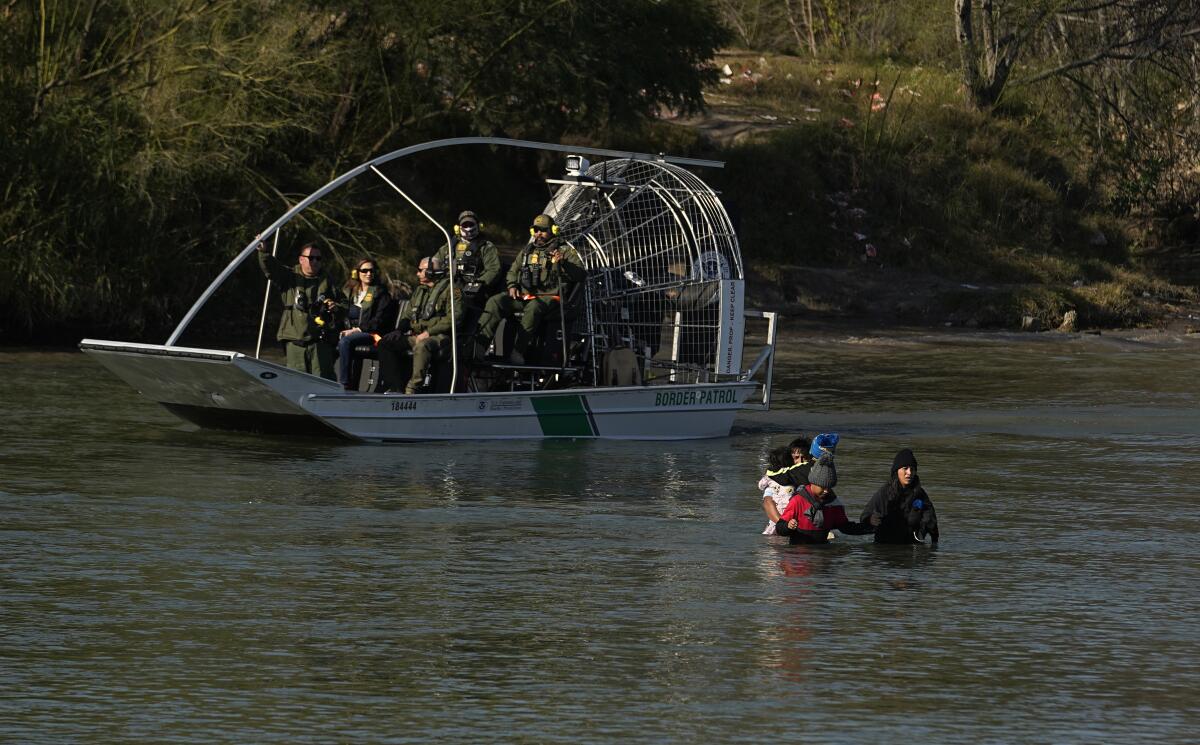What we know about the migrant drownings at Texas border

- Share via
A mother and her two children drowned Friday while trying to cross the Rio Grande in Mexico to enter the U.S., intensifying a battle between the Biden administration and Texas Republican Gov. Greg Abbott, who has seized a city park in a major corridor for illegal crossings and denied entry to Border Patrol agents.
The deaths have also highlighted the increased perils migrants face under Texas’s stepped-up border policies, as the river’s fierce currents are known to overtake migrants in their attempt to cross into the United States.
CNN reported that the Biden administration has given Texas until the end of Wednesday to stop blocking the Border Patrol’s access to the 2.5-mile stretch of land bordering the river before it will “refer the matter to the Department of Justice for appropriate action.”
The Biden administration has also asked the Supreme Court to intervene.
The drownings happened in the Texas border town of Eagle Pass, near an area known as Shelby Park, a public park that sits on the banks of the Rio Grande, a main route for illegal immigration from Mexico that has become a key part of Abbott’s aggressive crackdown to stop migrants from crossing the border. The state seized control of the park and sealed off access to the public and federal agents.
Abbott issued a statement Sunday night on X, formerly Twitter, saying President Biden “is doing everything possible to eliminate strategies that actually prevent illegal immigrants from entering our country.”
“Texas will continue to use every tool possible to block illegal immigration,” Abbott wrote.
Whether a lack of access played a role in the deaths is disputed between the federal government and Texas authorities.
Here’s what we know and the questions that remain.
What the federal government says
The Department of Justice on Monday asked the Supreme Court to restore federal access, providing the most detailed account yet of the deaths.
In the filing, U.S. Solicitor General Elizabeth Prelogar said Mexican officials alerted the Border Patrol to two migrants in distress on the U.S. side of the Rio Grande in the area near the Shelby Park boat ramp around 9 p.m. on Jan. 12.
Mexican officials also told the Border Patrol that three migrants had drowned around 8 p.m. that evening in the same area, Prelogar wrote.
That account counters initial claims that the woman and two children had drowned after state soldiers blocked federal agents from reaching them.
However, the Border Patrol still asserts in a sworn statement from a chief patrol agent that Texas soldiers blocked Border Patrol officers from getting to the two other migrants who were in distress.
Mexican officials on Saturday confirmed that they had recovered the bodies of the three drowned migrants and rescued four other migrants, including the two initially reported to be in distress who had attempted to return to Mexico, according to the filing.
“It is impossible to say what might have happened if Border Patrol had had its former access to the area — including through its surveillance trucks that assisted in monitoring the area,” Prelogar wrote. “At the very least, however, Border Patrol would have had the opportunity to take any available steps to fulfill its responsibilities and assist its counterparts in the Mexican government with undertaking the rescue mission. Texas made that impossible.”
According to the filing, an acting supervisory Border Patrol agent went to Shelby Park’s gate entrance to inform the Texas National Guardsman stationed there about the situation. The Border Patrol official spoke to the guardsman through a closed gate and was denied entry to the park, the solicitor general wrote.
The Border Patrol official requested to speak with a supervisor, who was contacted and placed on speakerphone, and was told Border Patrol agents could not access the park, even in “emergency situations,” Prelogar wrote. National Guardsmen were sent to investigate.
A statement issued by the Homeland Security Department said that “Border Patrol agents were physically barred by Texas officials from entering the park,” and called the governor’s policies “cruel, dangerous, and inhumane.”
“Texas’s blatant disregard for federal authority over immigration poses grave risks,” the agency said.
Friday evening’s incident demonstrates that “Texas is firm in its continued efforts to exercise complete control of the border,” and “to block Border Patrol’s access to the border even in emergency circumstances,” Prelogar wrote.
What Texas authorities say
The Texas Military Department released a statement Sunday night disputing the federal government’s account and calling it “wholly inaccurate” that Border Patrol agents were prevented from saving the migrants.
“At the time that Border Patrol requested access, the drownings had occurred, Mexican authorities were recovering the bodies, and Border Patrol expressed these facts to the TMD personnel on site,” the department said.
According to the statement, soldiers confirmed that when the Border Patrol requested access to the park they stated that Mexican authorities had already recovered the bodies of two drowned migrants. The Border Patrol “specifically” requested access to the park to locate two migrants assumed to be traveling with those who drowned and who had crossed the boat ramp, the military said.
The military said it apprehended two migrants, releasing one migrant to the Department of Public Safety and transferring another to emergency medical services because of hypothermia. Military officials searched the river with lights, thermals and night-vision goggles but did not see any other migrants trying to cross or in distress, the statement said.
“At no time did TMD security personnel along the river observe any distressed migrants, nor did TMD turn back any illegal immigrants from the US during this period,” the Texas Military Department said. “Also, at no point was TMD made aware of any bodies in the area of Shelby Park, nor was TMD made aware of any bodies being discovered on the US side of the border regarding this situation.”
Political battle on the southern border
Unauthorized migration across the U.S. southern border hit record levels in fiscal 2023, which ended in September, topping 2 million for the second year in a row, according to the Migration Policy Institute.
Eagle Pass, a town of about 28,000 people, is one of several border cities that has experienced a dramatic increase in crossings, with thousands of migrants entering daily in recent weeks.
In 2021, Abott launched Operation Lonestar, a border security initiative that has drawn criticism from environmentalists, advocacy groups and lawmakers, and has become the focus of multiple lawsuits questioning its constitutionality. Under the program, the state has deployed thousands of Texas National Guard soldiers across its 58 counties, including to Eagle Pass, where they’ve been directed to arrest and detain migrants for state trespassing.
Other tactics used to deter migrants have included deploying concertina wire, a makeshift wall of shipping containers and a floating barrier of wrecking-ball-sized river buoys outfitted with serrated blades.
The drowning deaths have heightened the showdown between Texas and the federal government over border security and illegal immigration, a national issue that is expected to be a central feature of the 2024 election cycle.
Biden has come under fire from Republicans, who cast his border policies as weak, but also from some fellow Democrats. Democratic mayors of New York and Chicago, among other large cities, have said services are buckling under a steady swell of migrants and have criticized the federal government for its handling of the issue.
In Congress, Republicans have been insisting that Biden agree to major changes in immigration policy, especially regarding the legal right of migrants to claim asylum in the U.S. In the Senate, Republicans have insisted on a border agreement as their price for voting in favor of sending additional aid to Ukraine, a high priority for Biden.
More to Read
Sign up for Essential California
The most important California stories and recommendations in your inbox every morning.
You may occasionally receive promotional content from the Los Angeles Times.











